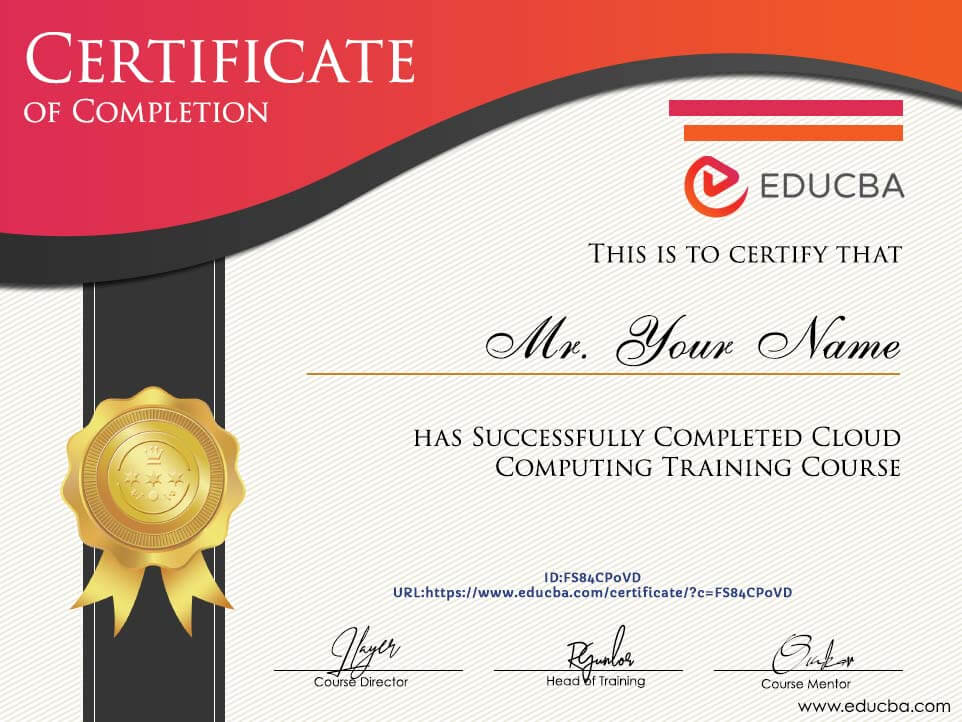CLOUD COMPUTING
Specialization | 23 Course Series
This Cloud Computing Training Course includes 23 courses with 141 hours of video tutorials and One year access. You will also get verifiable certificates (unique certification number and your unique URL) when you complete each of them. It includes learning Virtualization and Cloud Computing, AWS Amazon Web Services, Microsoft Azure, Amazon Cloud Computing, to learn technical delivery of Cloud software development capabilities.
Offer ends in:
What you'll get
- 141 Hours
- 23 Courses
- Course Completion Certificates
- One year access
- Self-paced Courses
- Technical Support
- Mobile App Access
- Case Studies
Synopsis
- Courses: You get access to all videos for a lifetime
- Hours: 141 Video Hours
- Core Coverage: Virtualization and Cloud Computing, AWS Amazon Web Services, Microsoft Azure, Amazon Cloud Computing, Azure Data Lake, Azure Data Factory and such others to learn technical delivery of Cloud software development capabilities, including analytics and infrastructure concepts.
- Course Validity: One year access
- Eligibility: Anyone serious about learning data science and wants to make a career in analytics
- Pre-Requisites: Basic knowledge of data and analytics
- What do you get? Certificate of Completion for the course
- Certification Type: Course Completion Certificates
- Verifiable Certificates? Yes, you get verifiable certificates for each 23 course, Project with a unique link. These link can be included in your resume/Linkedin profile to showcase your enhanced skills
- Type of Training: Video Course – Self-Paced Learning
Content
-
MODULE 1: Cloud Computing Essentials Training
Courses No. of Hours Certificates Details Amazon Web Services (AWS) Certified 2024 8h 58m ✔ Solutions Architect Associate - AWS Certified 9h 4m ✔ AWS Certified Cloud Practitioner Case Study - Hosting an ASP.NET Website on Amazon EC2 7h 24m ✔ AWS Certified Developer Associate 2024 7h 01m ✔ AWS Case Study - Simple Email Service AWS SES 2h 3m ✔ AWS Certified DevOps Engineer Professional 2024 4h 39m ✔ AWS Certified SysOps Administrator - Associate 8h 4m ✔ Virtualization and Cloud Computing 58m ✔ Cloud Migration 3h 4m ✔ Cloud Computing for Business Users 1h 57m ✔ EXIN Cloud Computing Tutorials 2h 36m ✔ Cloud Computing 2h 46m ✔ Cloud Computing Fundamentals 2h 05m ✔ AWS Services Case Study - Build Server less Web Application 57m ✔ -
MODULE 2: Microsoft Azure Cloud Computing
Courses No. of Hours Certificates Details Microsoft Azure - Basics 10h 53m ✔ Microsoft Azure - Essentials 6h 39m ✔ Microsoft Azure - Data Lake 6h 13m ✔ Microsoft Azure - Data Factory 4h 6m ✔ -
MODULE 3: Learning from Practicals & Case Studies
Courses No. of Hours Certificates Details Microsoft Azure - PAAS Overview 1h 52m ✔ Azure Practical - Developing Your Applications 4h 19m ✔ Azure Practical - Migration of Websites and Databases to Azure 2h 32m ✔ Azure Practical - Migrating .NET-based web applications to Azure PAAS 1h 43m ✔ Chef Devops Essentials 2h 21m ✔
Sample Certificate

Requirements
- Willingness to pursue a career: Every individual who wants to pursue a career in cloud computing domain, should make themselves capable enough to understand the need of these all. They should have eager to persistently practice and brush up their knowledge in the cloud computing domain, there are always new concepts coming in this domain and you need to be up to date about that. If you are committed to this career, this cloud computing course will boost your skills and will make you an asset to your organization. Skill and passion when blended together, give perfection to your work.
- Basic skill in Information Technology: Learning cloud computing means you need to have a basic understanding of IT. Here we are not talking about any degree in computer science, however, you should understand a computer, computer networks, databases, data processing, data retrieval, virtualization, software engineering concepts, etc.
Target Audience
- Students of Cloud Computing: If you’re a student of cloud computing and want a career in the cloud computing domain. This cloud computing course will make you build the gap between your college curriculum and the industry related to cloud computing by giving you practical and live experiences of cloud computing projects.
- IT Professional: If you are among the IT professionals like project managers, administrators, developers, executives, etc then you should take this course, as this cloud computing course will help you better run the projects and making the decisions. This course will make you aware of the acronyms and working principles of cloud computing.
- Cloud Computing Professionals: If you are already into cloud computing and want to take your career path to the next level, this cloud computing course is definitely for you. Deep concept, explanation and working will help you go deeper and challenge yourself. Nowadays, many cloud computing designations are newly opening in the corporate world, which demands well-to-do knowledge of cloud computing things. So that technical decisions are better made.
Course Ratings

Offer ends in:
Training 5 or more people?
Get your team access to 5,000+ top courses, learning paths, mock tests anytime, anywhere.
Drop an email at: [email protected]

Another very good course. I really enjoyed this AWS course and found it to be very informative. The instructor was excellent as with all EDUCBA courses I have taken. I highly recommend this course.
Peleg Holzmann
I learn new things about comuting and cloud... so iam glad that I learn and first time take course in educba platform, and also first time I learn about clouding and virtualization.. I think I pay money to take courses with certifications, and I surprise when finished this course that I should pay extra money to get certification or write long feedback.. this is not a good idea .
Raed toghuj
One may find the course (i.e., Virtualization and Cloud Computing) interesting and filled with current information. This course content was delivered in an informative manner. This instructor appeared to be very knowledgeable about the subject manner. I would recommend this course for those interested in learning more about cloud computing.
Lester Darris, DBA
Wonderful course of Cloud Migration, how to, workschemes on how to create VM's and migrate existing services to the cloud. Overview of the AWS Migration Methodology, estimating the total cost of migration (TCM), building the migration plan, learning a lot of migration techniques with examples.
Bart Remels